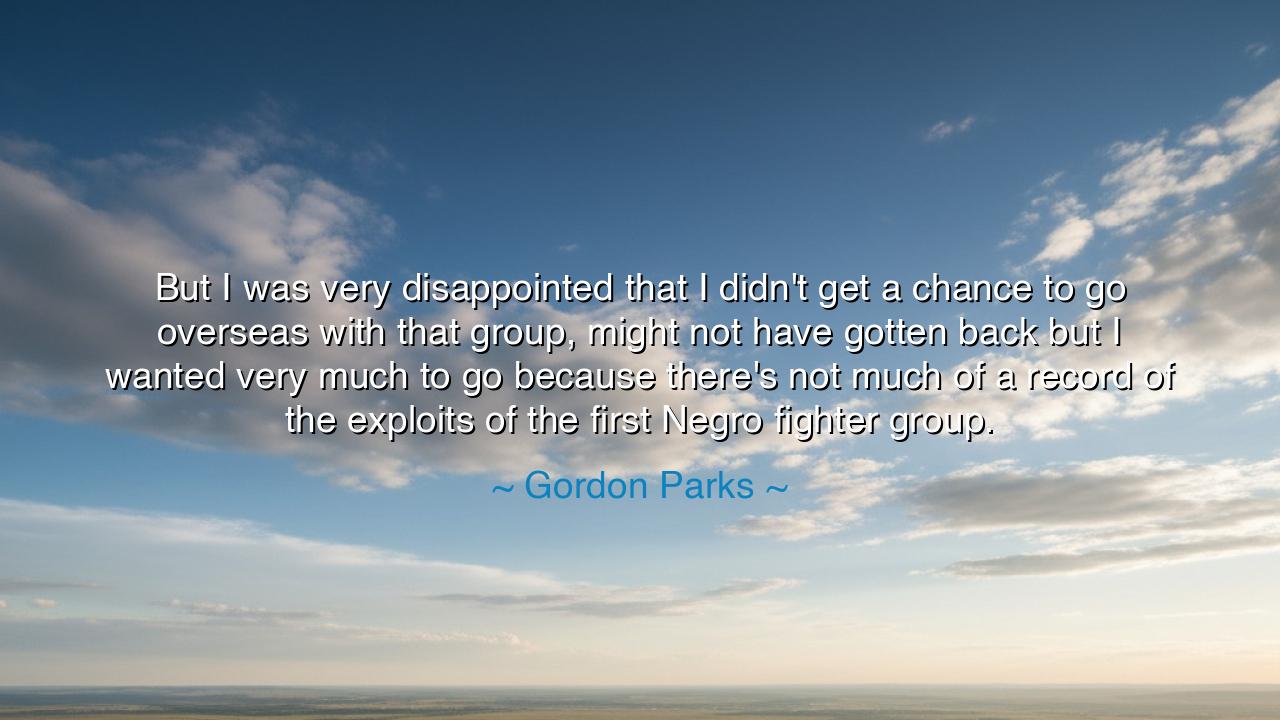
But I was very disappointed that I didn't get a chance to go
But I was very disappointed that I didn't get a chance to go overseas with that group, might not have gotten back but I wanted very much to go because there's not much of a record of the exploits of the first Negro fighter group.






In the vast ocean of history, there are stories that remain in the shadows, untold, obscured by time, circumstance, or the biases of those who have written the records. Gordon Parks, a man whose life bridged the worlds of photography, film, and activism, once spoke with a deep longing about an opportunity lost: "But I was very disappointed that I didn't get a chance to go overseas with that group, might not have gotten back but I wanted very much to go because there's not much of a record of the exploits of the first Negro fighter group." In these words, Parks unveils the heart of his disappointment, not merely in the missed opportunity, but in the desire to preserve the stories of the first Negro fighter group, a chapter of history that had been largely forgotten by the wider world.
The first Negro fighter group, known as the Tuskegee Airmen, were pioneers, heroes who broke racial barriers in the heat of World War II. Their courage, skill, and determination are woven into the very fabric of American and military history. Yet, their stories, for a long time, were often neglected, overshadowed by the mainstream narratives of war heroes. Parks's words are a lament for those stories left untold, a recognition of the importance of documenting the contributions of those who were too often silenced or ignored. His desire to join the group, to capture their stories, speaks to the deep need to preserve legacy, to ensure that the struggles and triumphs of such figures are not lost to time.
Consider the story of Herodotus, the ancient historian often called the "Father of History," who understood the importance of recording the deeds of the past. Herodotus traveled far and wide, gathering stories of distant lands, of battles and peoples, not only for the sake of entertainment, but for the purpose of preserving their memory. In an age when oral tradition ruled, Herodotus knew that without a written record, the deeds of men—great and small—would fade into nothingness. Parks, much like Herodotus, recognized that history could not be trusted to the whims of time alone. It required effort, intention, and passion to ensure that the truth of human experience was captured and shared with the generations to come.
The importance of memory and storytelling is seen in the ancient epics—The Iliad and The Odyssey—where the tales of warriors and kings were immortalized, not just for their entertainment, but for the lessons they offered to society. Homer’s heroes, like Achilles and Odysseus, may have been products of myth, but their struggles and triumphs spoke to the values of the Greek people. These tales were vital not just for entertainment, but for the very identity of the culture. Parks, in his desire to share the stories of the Tuskegee Airmen, sought to ensure that the sacrifices and achievements of these men would be woven into the larger narrative of American identity. To leave them out was not just an omission of fact—it was an erasure of history itself.
History, like Parks understood, is not merely a collection of events; it is the living, breathing record of those who came before us. If we neglect to tell the stories of the marginalized, of the unknown heroes, we risk losing the very essence of the human experience. The Tuskegee Airmen—black men who fought against fascism abroad and prejudice at home—deserved their place in the annals of history. Parks’s disappointment stems from a profound understanding that to leave their stories untold was not only an injustice to them, but to future generations who could learn from their example of courage, resilience, and sacrifice.
The lesson Parks offers is one that calls upon us to remember the importance of preserving history. It is not enough to live in the present and focus solely on what lies before us. We must also honor those who came before, who paved the way with their sacrifices and efforts, often in silence. Just as Herodotus traveled to gather the truths of those who might otherwise have been forgotten, so too must we seek out the stories that are often overlooked. To ensure that history is told in its fullness, we must embrace the role of the storyteller, the preserver of memory.
In your own life, reflect on the stories that have shaped you, the heroes, the ordinary and extraordinary people whose deeds have been overlooked by time. Parks’s desire to document the Tuskegee Airmen calls upon us to record the untold, to celebrate the voices that have been silenced. Take time to write, to speak, and to share the stories that matter, whether in your personal history, your community, or the world. Remember that history is not just written by the victors, but by those who take the time to listen, to learn, and to remember. The truth of the human journey lies not in its grandest moments alone, but in the quiet stories of those who fought, loved, and lived without the recognition they deserved. It is in these stories that the soul of history is preserved.






AAdministratorAdministrator
Welcome, honored guests. Please leave a comment, we will respond soon